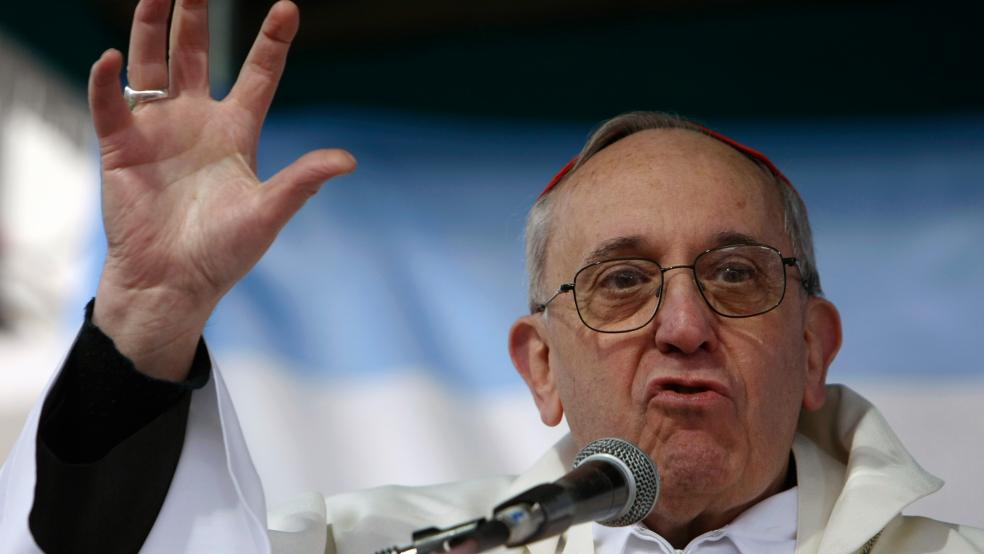Perhaps it’s divine intervention that Pope Francis is making his inaugural visit to the United States in the midst of a presidential campaign dominated by candidates who have never held office.
Political outsiders Donald Trump, Ben Carson and Carly Fiorina sit atop the field of GOP White House contenders and Democratic frontrunner Hillary Clinton argues she would be as much an outsider as any other candidate since she would be the first female commander-in-chief.
Related: From Bouncer to Pope—21 Fascinating Facts About Pope Francis
The anti-establishment feeling coursing through American politics should benefit His Holiness as he meets with President Obama and address a joint meeting of Congress on Thursday.
Since his elevation in 2013, Pope Francis has taken on the Vatican and realigned the Catholic Church’s focus toward “social justice” issues, such as caring for the poor and combating climate change, while maintaining traditional positions on issues like abortion and gay rights.
In many ways, he has sought to lead by example. He eschewed some of the more traditional trappings of his post, including wearing ceremonial robes and residing in an official residence in Vatican City for a more modest dorm nearby, and warned against the dangers of unbridled capitalism.
Francis’ ability to navigate the issues, rather than adhere to a strict ideological doctrine, has won him adherents around the globe. That’s why both parties have found a lot to like – and dislike -- about him and have tried to capitalize on his visit to advance their own agendas.
Francis was criticized in the U.S. and elsewhere when his rhetoric turned political. He blamed unbridled capitalism and consumerism for the suffering of the poor and called global financial institutions the new colonialists.
Related: Bernie Sanders and the Pope Agree on One Fundamental Issue
Hours before the Pontiff’s airplane touched down on U.S. soil, Senate Democrats successfully blocked Republican legislation that would prohibit most abortions after 20 weeks of pregnancy. The measure failed to get the necessary 60 votes to cut off debate but the attempt will allow GOP lawmakers to brush up their anti-abortion bona fides just in time for Francis’ high-profile visit.
Senate Democrats aren’t without sin, either. Just before the chamber vote, top Democrats unveiled what they billed as a comprehensive energy policy aimed at cutting greenhouse gas emissions by at least 2 percent each year through 2025.
The Pope may have crossed a line when he called global financial institutions the new colonialists and blamed capitalism for creating poverty.
Like the GOP anti-abortion bill, the timing isn’t a coincidence. Democrats believe the Pontiff is firmly in their corner on the issue after he issued an encyclical earlier this year that amounted to a call for action against climate change.
House Democrats also looked to influence the Pope’s speech to Congress on Thursday, putting out a video that urged him to discuss immigration, poverty and climate change in his address.
Related: Before He Was Pope: Francis' Life in Pictures
For its part, the Obama administration has tried to portray itself as agnostic about the historic visit.
“This is not a meeting between politicians and this is not an opportunity to advance anyone’s political agenda,” White House press secretary Josh Earnest said Tuesday, even though the two are expected to discuss the thaw in U.S.-Cuba relations Pope Francis helped broker, the Iran nuclear deal and the migrant crisis out of Syria.
Earnest predict the president would “arrive at this meeting with a very open mind,” an acknowledgement that the duo wouldn’t agree on everything.
Speaking to reporters aboard his plane on the flight from Cuba to Washington, Pope Francis reportedly rejected descriptions that he is a “leftie” and argued that all of his views are in line with the social doctrine of the Catholic Church.
He also said he would not discuss the U.S. trade embargo of Cuba when he addresses Congress, suggesting he might sidestep political issues that have polarized Capitol Hill.





